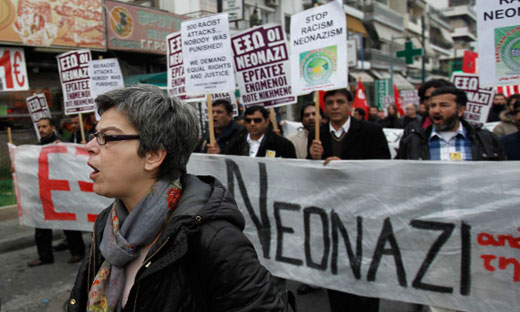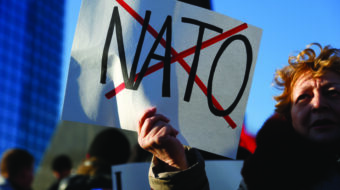
Commenting on Ukrainian developments, French Foreign Minister Laurent Fabius pooh-poohed the idea that there is a fascist danger:
“When one accuses that government [that has seized power in Kiev] of being on the extreme right, that’s false, that’s false…..there are three members of the Svoboda Party [in the interim Ukrainian cabinet]…. which is a party further to the right than the others.”
This statement was criticized by the Russian government and by elements of the French press. It is inaccurate; there are at least six Svoboda members in Arseny Yatsenyuk’s government, as well as elements from the even more extreme Right Sektor. Far right extremists hold key positions controlling internal security, defense, the prosecutor’s office and economic ministries, as well as the national bank. Further, the statement by Fabius that Svoboda is “more to the right” than other parties seems to suggest that they are a just a wee bit conservative, but most observers see them as neo-Nazi or fascist. That Yatsenyuk is of Jewish origin does not negate past anti-Semitic utterances of Svoboda leaders.
The fascist presence is real and is not confined to the Ukraine. It is found in many Eastern European countries, and some Western ones, including France itself. The growth of the Jobbik party in Hungary, the Slovak National Party in Slovakia, and others in the Balkan and Baltic countries, is evidence. In Greece the Golden Dawn party got into parliament in spite of violence against immigrants, and the crowd that backs former Italian Prime Minister Silvio Berlusconi in Italy is riddled with fascists.
What is the root of the new burst of fascism?
Many European countries are facing an extreme economic crisis. We hear about Greece, Portugal, Italy, Spain and Ireland, but Ukraine is in the worst shape of all, with a per-capita gross domestic product of $7,421, lowest in Europe and about the same as El Salvador.
European governments, pressured by their own ruling classes and by the “troika” of the European Central Bank, the European Union and the International Monetary Fund, have tried to “resolve” the crisis almost exclusively by austerity measures: Laying off millions of public employees, cutting wages and pensions, selling off state assets and shredding the social safety net. These measures are designed to protect Europe’s one percent by shifting the entire burden onto the shoulders of the most vulnerable elements of the 99 percent.
The governments say they have to impose these painful measures or they will not get any of the loans that the troika is facilitating exclusively for countries that toe its line. Spokespersons of the new Kiev regime have bluntly stated they will impose yet more austerity even if it amounts to “political suicide.”
The social democratic parties, out of power, have denounced the austerity measures but, once in power, have been unable or unwilling to sharply change direction, and end up implementing the same austerity policies. Discredited and thrown out of power, they are replaced by openly right-wing parties. This has happened in Greece, Spain, and Portugal and, if elections were held today, would happen in France too.
On the left, the communist parties and their allies have worked consistently, along with the unions, to organize mass resistance to austerity. They would like to replace the top down “unity” of the European Union and Eurozone with international working-class solidarity, but are not yet strong enough.
On the far right, the Svoboda-type of extremist party tries to shift the focus of the people’s anger to scapegoats: Jews, immigrants, Roma, minorities, neighboring countries, gay people, communists, and the left. Their anti-austerity rhetoric and their nationalistic railing against the European Union are demagogic and serve ruling class interests.
The communists and allies have some grassroots strength in some countries (Portugal, Czech Republic, and Ukraine). In others, they are not as strong, and in yet others they are repressed. In many countries the fascist ultra-right is advancing. That people like Mr. Fabius, a nominal socialist, denigrate fears about a fascist resurgence adds to the peril, especially as his government has tried to neutralize France’s fascists (the Frente Nacional) by borrowing from their anti-Roma program.
The anti-communism of the fascist and neo-Nazi ultra right, which has involved demands by Svoboda for the banning of the Communist Party and attacks not only on statues of Lenin, but of monuments to soldiers who fought and died in the struggle against Hitler, has the practical purpose of weakening the right’s most most natural rivals for the allegiance of the discontented victims of the crisis-the communists themselves.
On Mar. 16 neo-Nazis marched in Riga, Latvia, to “honor” surviving Latvian Waffen SS troops who served in World War II. Anti-Nazis who wanted to enter Latvia to participate in counter demonstrations were stopped. The Latvian prime minister found it necessary to fire her environment minister, Einars Cilinskis, of the National Party, because he marched with the SS men in defiance of her orders.
Photo: Scene from a recent protest against racism and neo-Nazism near Athens, Greece. AP












Comments